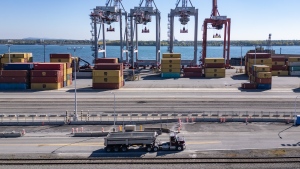The ongoing partial strike by longshoremen at the Port of Montreal is already causing significant repercussions, according to port officials.
The strike, which began on Monday, has resulted in a decrease in cargo handling and has caused delays in the delivery of goods. This has had a direct impact on the economy, as the port is a crucial hub for international trade and commerce.
The strike is a result of a dispute between the longshoremen’s union and the Maritime Employers Association (MEA) over working conditions and scheduling. The union has accused the MEA of not respecting their collective agreement and has called for better working conditions and more stable schedules.
The MEA, on the other hand, argues that the union’s demands are unreasonable and would result in increased costs for the port and its clients. They have also expressed concerns about the impact of the strike on the port’s reputation and competitiveness.
The strike has already caused several shipping companies to divert their vessels to other ports, resulting in a loss of revenue for the Port of Montreal. This has also affected the supply chain, with some businesses reporting shortages of essential goods.
The federal government has been closely monitoring the situation and has urged both parties to come to a resolution. They have also stated that they are prepared to intervene if necessary to protect the national economy.
In the meantime, negotiations between the union and the MEA are ongoing, but no agreement has been reached yet. The strike is expected to continue until at least Friday, with no indication of when it will end.
The Port of Montreal is a vital part of the Canadian economy, and any disruption to its operations has far-reaching consequences. It is crucial that a resolution is reached soon to minimize the impact on businesses and consumers.




